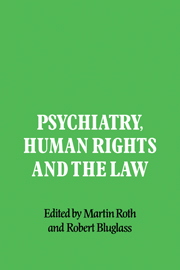Book contents
- Frontmatter
- Contents
- Editors' preface
- Contributors
- The historical background: the past 25 years since the Mental Health Act of 1959
- The social and medical consequences of recent legal reforms of mental health law in the USA: the criminalization of mental disorder
- The recent Mental Health Act in the United Kingdom: issues and perspectives
- Medical and social consequences of the Italian Psychiatric Care Act of 1978
- Lessons for the future drawn from United States legislation and experience
- Recent developments in relation to mental health and the law in the Federal Republic of Germany
- Psychopathy and dangerousness
- Dangerousness in social perspective
- Psychiatric explanations as excuses
- Detention of patients: administrative problems facing Mental Health Review Tribunals
- Developments in forensic psychiatry services in the National Health Service
- The role of psychiatry in prisons and ‘the right to punishment’
- Human rights in mental health
- Changes in mental health legislation as indicators of changing values and policies
- The Danish experience: one model of psychiatric testimony to courts of law
- A postscript on the discussions at the Cambridge Conference on Society, Psychiatry and the Law
Changes in mental health legislation as indicators of changing values and policies
Published online by Cambridge University Press: 04 August 2010
- Frontmatter
- Contents
- Editors' preface
- Contributors
- The historical background: the past 25 years since the Mental Health Act of 1959
- The social and medical consequences of recent legal reforms of mental health law in the USA: the criminalization of mental disorder
- The recent Mental Health Act in the United Kingdom: issues and perspectives
- Medical and social consequences of the Italian Psychiatric Care Act of 1978
- Lessons for the future drawn from United States legislation and experience
- Recent developments in relation to mental health and the law in the Federal Republic of Germany
- Psychopathy and dangerousness
- Dangerousness in social perspective
- Psychiatric explanations as excuses
- Detention of patients: administrative problems facing Mental Health Review Tribunals
- Developments in forensic psychiatry services in the National Health Service
- The role of psychiatry in prisons and ‘the right to punishment’
- Human rights in mental health
- Changes in mental health legislation as indicators of changing values and policies
- The Danish experience: one model of psychiatric testimony to courts of law
- A postscript on the discussions at the Cambridge Conference on Society, Psychiatry and the Law
Summary
Change raises mixed emotions. In particular, fear associated with the unknown and doubt caused by change, are especially likely to occur when trans-disciplinary activity takes place, as it does in law's involvement in psychiatry. In fact, this activity and the change that it generates may even be perceived as a crisis by some psychiatrists. The Chinese write the word ‘crisis’ by combining the symbols for two other words. Those words are ‘danger’ and ‘opportunity’. Both factors are present at this critical time of transition from the old to the new mental health law in England and in other countries where similar changes have taken place.
The aim in the first part of this paper is to identify some of the major changes which have been enacted in the new English legislation and then, by way of comparison with the old legislation and with the approaches adopted in other jurisdictions, particularly the Canadian jurisdiction of Ontario, to try to articulate the shifts in values and policies represented by these new laws. This is not an easy task and, in itself, involves value judgment. In fact, the questions asked, the values detected, the range of values used as a base-line, and the relative importance the values are given, all involve elements of value judgment. However, some measure of objectivity is possible. In particular, one result of identifying and articulating underlying principles is that these principles can be judged, not only by the person carrying out that task, but also by others and, often, somewhat more objectively.
- Type
- Chapter
- Information
- Psychiatry, Human Rights and the Law , pp. 156 - 214Publisher: Cambridge University PressPrint publication year: 1985
- 1
- Cited by



